人教版七年级英语上册Unit6复习
人教版英语七年级上册U6 Do you like bananas复习学案

Review of Unit 6 Do you like bananas? 第一部分:基础知识梳理Part 1:重点单词同步检测:1.1 have hamburgers for b2.Here are some tomatoes.Do you like t3.1 like French f1.1have some ice c5.Children should(应当)eat lots of v6. What do you have for d?7.Zhou Jielun is a singing s8.She eats h food every day.Part 2:根据汉语或英语提示翻译下列短语1. 一个苹果/蛋2. 两个汉堡包3. 一些西红柿11.所有的蔬菜12.体育明星13.吃得好4 . 一些牛奶/沙拉5 .许多草莓6 .许多面包7 . 一些牛奶/沙拉8 .许多草莓9 .许多面包14 .她的饮食习惯15 .吃早/午/晚餐16 .作为早/午/晚餐17 .健康的食物.最后一个问题 18 .问某人有关某事.想要做某事 想要某人做某事同步检测:Everyone knows 1.is very important for our health. If you 2. eat healthily, the following tips (提示) may be helpful to you.Firstly, 3.the food you should eat. Do you4. 5. meat? We can have some fish, chicken and pork (猪肉)every day, but we should not eat too much meat. Besides, don't eat ice-cream a lot, or you will 6.. Secondly, you should have a good 7.. When you 8.a sports star his habits in eating, he may tell you to have many kinds of food every day. It is not good to 9.too much food. You may find it difficult to fall asleep (睡着).10.pay attention to (注意)our eating and have a healthy body.书面表达你有健康的饮食习惯吗?假设你是David,下面是你总结的自己的三餐喜好,请 根据表格内容写一篇短文,介绍你自己的饮食习惯。
人教版七年级英语上册 Unit 6 知识归纳(含答案)
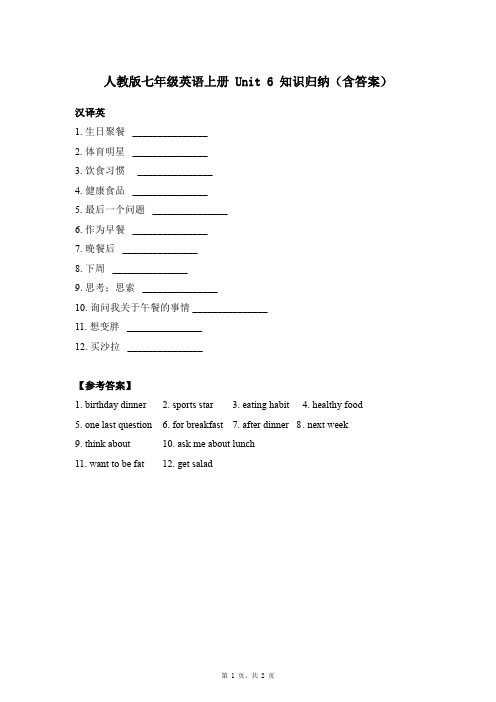
人教版七年级英语上册 Unit 6 知识归纳(含答案)汉译英1.生日聚餐_______________2.体育明星_______________3.饮食习惯_______________4.健康食品_______________5.最后一个问题_______________6.作为早餐_______________7.晚餐后_______________8.下周_______________9.思考;思索_______________10.询问我关于午餐的事情_______________11.想变胖_______________12.买沙拉_______________【参考答案】1. birthday dinner2. sports star3. eating habit4. healthy food5. one last question6. for breakfast7. after dinner8. next week9. think about10. ask me about lunch11. want to be fat12. get salad汉译英1. Cindy认为她妹妹喜欢冰激凌。
____________________________________ 2.那么咱们喝牛奶吧!____________________________________ 3. Jack喜欢什么蔬菜?____________________________________ 4.——咱们早饭吃什么?——水果沙拉怎么样?____________________________________ ____________________________________ 5.——Tom喜欢梨吗?——不,他不喜欢。
____________________________________ ____________________________________ 6.——你们午饭后吃草莓吗?——是的,我们吃。
七年级上册Unit 6 人教版英语中考一轮复习(词汇+语法讲解)

一轮复习:七上U6 词汇+语法讲解【单词默写】【单词变性】healthy形容词变名词______________ really副词变形容词______________ well副词变形容词______________ week名词变形容词______________1. well ______________ _____________________ ___________________ ________________Well, let’s talk about it next time.Mary does well in English.I don't feel very well today.You can get water in the well.2. right ______________ _____________________ ___________________ ________________ ______________ Everyone has his own rights in the society.Yes, that’s right.All right, let’s go to the cinema.I’m sorry. That’s all right.I sit on the right of Mary while Mary sits on the left of me.3. then __________ ___________Till then, everything is too late.First, you put the meat into the pot. Then, mix it with water.4. question ________________ ________________I have many questions to ask my teacher.I was questioned by a policeman about the murder last night.5. want ________________ ________________I want to stay at home because of the rain.You are wanted to be a volunteer.The thief was wanted on the web.Do you want something to drink?【词汇用法】1. sure: adv./adj./be sure to do sth./be sure that…/make sure that…/make sure to do sth.2. so: adv./conj./so adj./adv. that/so that/so as to/not as adj./adv. so/I think so/I hope so.相关词辨析: because vs. sobecause: conj./因为/不与so连用so: conj./所以/不与because 连用3. habit: n./develop a habit of/break a habit of/good habits/bad habits近义词辨析: habit vs. custom vs. culturehabit: n./习惯custom: n./习俗culture: n./文化4. be: v./be+Adj./be+done/be+n./be+to do/be +doing/be +PP(prep. Phrase)5. eat: vt./eat sth./eat up近义词辨析: have vs. eathave: vt./have lunch(享用一餐)eat: vt./eat rice(享用具体的东西)【攻占语法】动词(二) 实义动词一、动词的分类: ____________ _____________ _____________ ______________二、动词的位置: 在句中充当_____________, 放在___________ 的前面或_____________的后面三、动词的用法:2. 实义动词1) 感官动词look/sound/taste/smell/feel +adj.2) 感观动词watch/see/hear/observe sb. do/doing sth.3) 使役动词make/let/have sb. do sth.get sb. to do sth.make sb./sth. donehave sth. donehave sth. doingget sb./sth. done4) 及物动词动词+名词5) 不及物动词动词单独使用动词+介词+名词请在及物动词的框内打”√”,不及物动词的框内打”×”□ask□buy □call□come □eat□excuse □find □finish □get□go□have□know□let□like□look□lose□meet□need□play□say□see□sell□sound□spell□take□thank□think□want□watch□help□love6) 双宾语动词动词+间接宾语+直接宾语动词+直接宾语+to/for +间接宾语请在是双宾语动词的框内打”√”□teach □learn □buy□sell□order □lend □borrow □dress□bring□take□send□give□tell□pay□hand□show□offer□read□pass□help□want【词汇练习】1.Amy usually eats an a ________ after lunch because it's her favorite fruit.2.Let’s think about some food for Henry’s b ________ party.3.For b ________ I have a glass of milk and some bread. They are healthy.4.Potatoes, c ________, and cabbages are vegetables my son likes best.5.We always have rice, chicken and salad for d________.6.I want to know something about David, the volleyball star's e________ habit.7.I have e________ for breakfast every day.8.Judy likes eating sweet food and doesn’t like doing sports. As a result, she becomes f ________ and unhealthier.9.Eggs, milk and strawberries are all healthy f________.10.I eat f ________ and vegetables every day, which are good for my health.11. A good study h ________ will help you learn English well.12.Tom ate a big breakfast. He had a h ________, an egg and milk.13.Do you want to be h _______? Then you need to eat well and do sports every day.14.All the students have l________ at school from Monday to Friday.15.I can’t answer this q ________. It’s too difficult.16.I like English very much. It's r________ easy.17.I need some vegetables, fruits and yogurt to make fruit s ________.18.He doesn’t want to be late for school again, s ________ he eats quickly and runs to school.19.For fruit, Jack likes apples and s________.20.—Can you come to my party?—That’s for s _______.21.I want a bowl of t ________ noodles, because I like vegetables very much.22.Eat more v ________ and less meat, then you will be healthier.23.We have five English classes a w________.24.It is w________ known that Hangzhou is a perfect city for sightseeing.25.Please come to our club, you are w ________ to join us!【参考答案】healthy形容词变名词health really副词变形容词real well副词变形容词good week名词变形容词weekly1. well 好吧擅长感觉舒服井Well, let’s talk about it next time.Mary does well in English.I don't feel very well today.You can get water in the well.2. right 权力对的好吧没关系右边Everyone has his own rights in the society.Yes, that’s right.All right, let’s go to the cinema.I’m sorry. That’s all right.I sit on the right of Mary while Mary sits on the left of me.3. then 那时然后Till then, everything is too late.First, you put the meat into the pot. Then, mix it with water.4. question 问题询问I have many questions to ask my teacher.I was questioned by a policeman about the murder last night.5. want 想应聘通缉想要I want to stay at home because of the rain.You are wanted to be a volunteer.The thief was wanted on the web.Do you want something to drink?一、动词的分类: be 动词情态动词助动词实义动词二、动词的位置: 在句中充当谓语,放在主语的前面或宾语的后面三、动词的用法:请在及物动词的框内打”√”,不及物动词的框内打”×”√ask√buy √call×come √eat√excuse √find √finish √get×go√have√know√let√like×look√lose√meet√need√play√say√see√sell×sound√spell√take√thank×think√want√watch√help√love6) 双宾语动词动词+间接宾语+直接宾语动词+直接宾语+to/for +间接宾语请在是双宾语动词的框内打”√”√teach □learn √buy √sell √order √lend□borrow□dress√bring□take√send√give√tell√pay√hand√show √offer √read√pass□help□want【词汇练习】apple birthday breakfast carrots dinner eating eggs fatter food fruits habit hamburger healthy lessons question really salad so strawberries sure tomato vegetables week well。
人教版七年级上册英语知识点全第六单元unit6知识点
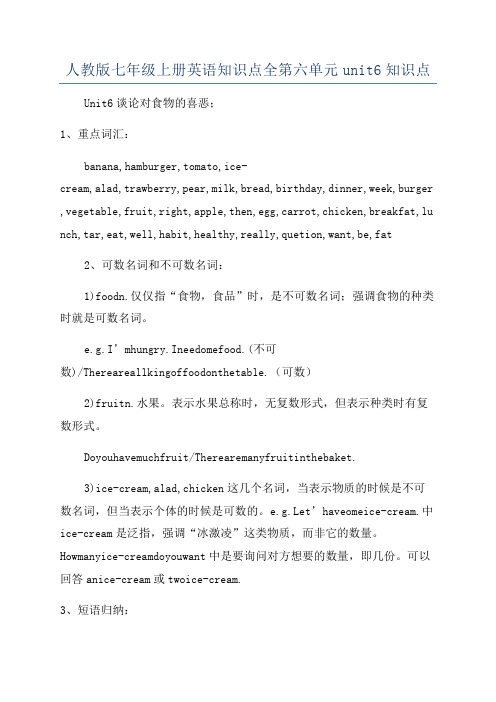
人教版七年级上册英语知识点全第六单元unit6知识点Unit6谈论对食物的喜恶;1、重点词汇:banana,hamburger,tomato,ice-cream,alad,trawberry,pear,milk,bread,birthday,dinner,week,burger ,vegetable,fruit,right,apple,then,egg,carrot,chicken,breakfat,lu nch,tar,eat,well,habit,healthy,really,quetion,want,be,fat2、可数名词和不可数名词:1)foodn.仅仅指“食物,食品”时,是不可数名词;强调食物的种类时就是可数名词。
e.g.I’mhungry.Ineedomefood.(不可数)/Thereareallkingoffoodonthetable.(可数)2)fruitn.水果。
表示水果总称时,无复数形式,但表示种类时有复数形式。
Doyouhavemuchfruit/Therearemanyfruitinthebaket.3)ice-cream,alad,chicken这几个名词,当表示物质的时候是不可数名词,但当表示个体的时候是可数的。
e.g.Let’haveomeice-cream.中ice-cream是泛指,强调“冰激凌”这类物质,而非它的数量。
Howmanyice-creamdoyouwant中是要询问对方想要的数量,即几份。
可以回答anice-cream或twoice-cream.3、短语归纳:John’birthdaydinner约翰的生日晚餐ne某tweek下周thinkabout思考,考虑howabout怎么样omefruit一些水果hibirthday他的生日porttar体育明星eatinghabit饮食习惯forbreakfat作为早餐fordinner作为晚餐onelatquetion最后一个问题healthyfood健康的食品3、tomato可数n.“西红柿”复数形式:tomatoe人教版七上2022知识点总结全类似的以o结尾的名词,需加–e构成复数形式的单词还有potato,hero但photo等词而是以加—构成复数形式的。
人教版七年级上册英语 Unit 6 词汇与语法基础(解析版)
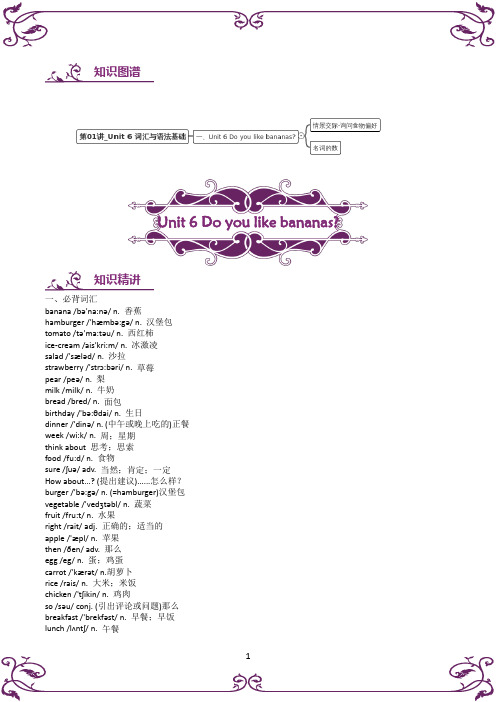
be /bi:/ v.变成
fat /fæt/ adj.肥的;肥胖的
二、重点词汇
1. strawberry noun /ˈstrɔːbər.i/
a small juicy red fruit that has small brown seeds on its surface, or the plant with white flowers on which this fruit grows草莓
B.tomatoes; photos
C.tomatos; photos
D.tomatoes; photoes
例1.2.2词的适当形式填空
There are a lot of new _________ (factory) in our city.
随练1.1---_________ Dale like bananas?
我的膝盖开始疼痛,因此我停下来不再跑了。
I was lost so I bought a street map.
我迷路了,所以买了一张街道地图。
5. healthy adjective /ˈhelθi/
1). strong and well强壮的;健康的
例句:
She’s a nor词汇
banana /bə'na:nə/ n.香蕉
hamburger /'hæmbə:gə/ n.汉堡包
tomato /tə'ma:təu/ n.西红柿
ice-cream /ais'kri:m/ n.冰激凌
salad /'sæləd/ n.沙拉
strawberry /'strɔ:bəri/ n.草莓
人教版英语七年级上册Unit6【重点短语+词法语法句法精讲】

【课堂笔记】人教版英语七年级上册Unit6常用词组1. my birthday dinner 我的生日宴会2. vegetable salad 蔬菜沙拉3. two tomatoes 两个西红柿4. eat well 吃得好5. think about 思考;思索6. eat/have breakfast/lunch/dinner吃早/中/晚饭7. a sports/volleyball star 一位运动/排球明星. next/this/last week 下/这/上星期9. ask sb. about sth. 问某人关于某事10. like hamburgers/ice-cream喜欢汉堡包/冰激凌11. like eating eggs 喜欢吃鸡蛋12. her eating habits 她的饮食习惯13. like chicken for dinner 喜欢吃鸡肉当作晚饭14. one last question 最后一个问题15. healthy food 健康的食物16. after breakfast/lunch/dinner 早/中/晚饭后17. want to be fat/healthy 想要变胖/健康1. have bread for breakfast 早饭吃面包19. a lot of strawberries=lots of strawberries=many strawberries许多草莓20. a lot of rice=lots of rice=much rice许多米饭重点句型1. —Do you like salad? 你喜欢沙拉吗?—Yes, I do./No, I don't.是的,我喜欢。
/不,我不喜欢。
2. —Does she like tomatoes? 她喜欢西红柿吗?—No, she doesn't. She doesn't like them.不,她不喜欢。
七年级上册英语六单元知识点归纳
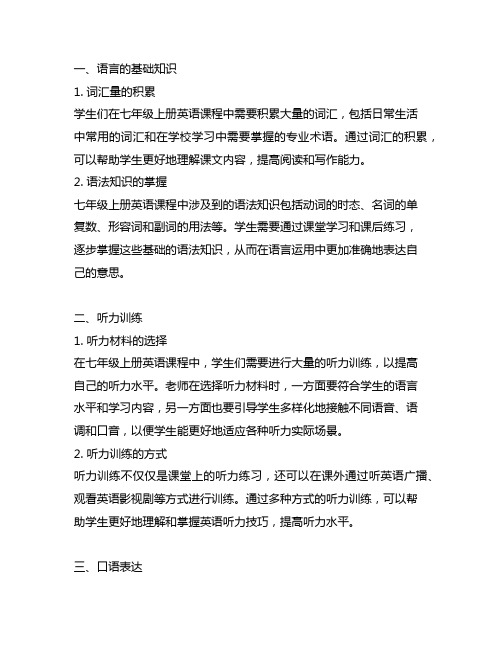
一、语言的基础知识1. 词汇量的积累学生们在七年级上册英语课程中需要积累大量的词汇,包括日常生活中常用的词汇和在学校学习中需要掌握的专业术语。
通过词汇的积累,可以帮助学生更好地理解课文内容,提高阅读和写作能力。
2. 语法知识的掌握七年级上册英语课程中涉及到的语法知识包括动词的时态、名词的单复数、形容词和副词的用法等。
学生需要通过课堂学习和课后练习,逐步掌握这些基础的语法知识,从而在语言运用中更加准确地表达自己的意思。
二、听力训练1. 听力材料的选择在七年级上册英语课程中,学生们需要进行大量的听力训练,以提高自己的听力水平。
老师在选择听力材料时,一方面要符合学生的语言水平和学习内容,另一方面也要引导学生多样化地接触不同语音、语调和口音,以便学生能更好地适应各种听力实际场景。
2. 听力训练的方式听力训练不仅仅是课堂上的听力练习,还可以在课外通过听英语广播、观看英语影视剧等方式进行训练。
通过多种方式的听力训练,可以帮助学生更好地理解和掌握英语听力技巧,提高听力水平。
三、口语表达1. 口语练习的重要性在七年级上册英语课程中,口语练习是非常重要的一环。
通过口语练习,学生不仅可以提高自己的口语表达能力,还可以锻炼自己的语音、语调和语速。
口语练习还可以帮助学生更好地融入英语学习环境,增强自信心。
2. 口语练习的方式老师可以通过角色扮演、小组讨论、情景对话等方式,引导学生进行口语练习。
学生也可以在课外积极参与英语角、英语演讲比赛等活动,提高自己的口语表达能力。
四、阅读训练1. 阅读材料的选择在七年级上册英语课程中,阅读训练是非常重要的一环。
老师在选择阅读材料时,要根据学生的兴趣爱好和实际水平,选择符合学生认知特点和学习目标的阅读材料。
要注重开展多样化的阅读活动,丰富学生的阅读内容,激发学生的阅读兴趣。
2. 阅读技巧的培养老师在进行阅读训练时,要引导学生培养良好的阅读习惯,包括预习、精读、泛读等阅读技巧。
要注重培养学生的阅读理解能力和阅读表达能力,使学生能够更好地理解课文内容,提高阅读水平。
人教版初中英语七年级上册期末复习Unit6知识与练习

人教版初中英语七年级上册期末复习Unit6知识与练习Unit 6 Do you like bananas ?1.单元词汇:tomato(复数) strawberry(复数) health(形容词) eat(现在分词) real(副词) be(现在分词) 吃得好(英语)吃午饭(英语) 在一周内(英语) 吃的习惯(英语) 一些鸡肉(英语) 喜欢吃水果(英语)下周(英语)2.词汇归类:水果:banana香蕉orange橙子strawberry草莓pear梨apple苹果蔬菜:tomato西红柿carrot胡萝卜broccoli花椰菜salad沙拉食品:hamburger汉堡包milk牛奶ice cream冰淇淋bread面包chicken鸡肉eggs鸡蛋3. sports star体育明星4.lots of = a lot of非常多,很多5.healthy food健康食品6. have sth. for breakfast/lunch/dinner/dessert早餐/中餐/晚餐/甜点吃……7.他喜欢吃蔬菜。
(英语)8.我们不喜欢沙拉,但她喜欢.(英语)9.Gina晚饭吃香蕉。
(英语)10.我不喜欢吃冰淇淋。
(英语)11.他不想变胖。
(英语)12.他考虑食品了吗?(英语)13.踢足球怎么样?(英语)14.She likes pears and apples. (否定句)15.David asks the volleyball star. (一般疑问句)16.不可数名词见P3317. have … for breakfast/ lunch/ dinner 早餐/ 午餐/ 晚餐吃……18. good(adj. 好的)& well(adv. 好)The good runner eats well.这个优秀的运动员吃得好。
19. 名词所有格:①一般加’s;以s 结尾的(特别是名词复数),在s 后加’ 如:Sally’s address 莎莉的地址the teachers’ room 老师们的房间three hours’ class 三小时的课② Mary and Linda's desk 玛丽和琳达的课桌(两个人共有的课桌,desk用单数)Mary's and Linda's birthday s玛丽的生日和琳达的生日(各自的生日,birthday用复数)③…of + 名词(无生命的物体) 如:the color of the sweater a photo of your family20.句式:1)询问某人是否喜欢某物的句型及答语—Do/Does sb. like sth.?—Yes,sb. do/does. —No,sb. don’t/doesn’t.—Do you like salad?—Yes,I do./ No,I don’t.—Does he like pears?—Yes,he does. / No,he doesn’t.2)祈使句——Let’s do sth. Let’s have ice cream.3)一般现在时的肯定句及否定句I like oranges. 否定句I don’t like bananas. They like salad. 否定句They don’t like broccoli. 疑问句:Do they like salad? She likes bananas. 否定句She doesn’t like ice cream. 疑问句:Does she like bananas?EXERCISES:一、单项选择。
人教版英语七年级上册 Unit 6 知识点梳理
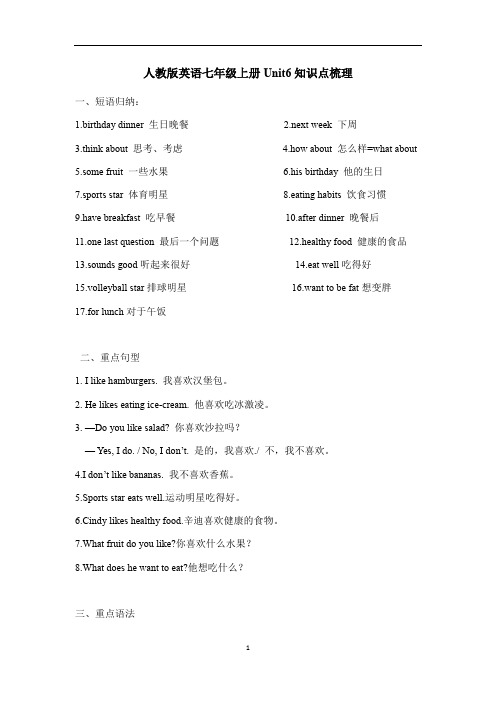
人教版英语七年级上册Unit6知识点梳理一、短语归纳:1.birthday dinner 生日晚餐2.next week 下周3.think about 思考、考虑4.how about 怎么样=what about5.some fruit 一些水果6.his birthday 他的生日7.sports star 体育明星8.eating habits 饮食习惯9.have breakfast 吃早餐10.after dinner 晚餐后11.one last question 最后一个问题12.healthy food 健康的食品13.sounds good听起来很好14.eat well吃得好15.volleyball star排球明星16.want to be fat想变胖17.for lunch对于午饭二、重点句型1. I like hamburgers. 我喜欢汉堡包。
2. He likes eating ice-cream. 他喜欢吃冰激凌。
3. —Do you like salad? 你喜欢沙拉吗?— Yes, I do. / No, I don’t. 是的,我喜欢./ 不,我不喜欢。
4.I don’t like bananas. 我不喜欢香蕉。
5.Sports star eats well.运动明星吃得好。
6.Cindy likes healthy food.辛迪喜欢健康的食物。
7.What fruit do you like?你喜欢什么水果?8.What does he want to eat?他想吃什么?三、重点语法1.可数名词:banana-bananas hamburger-hamburgers tomato-tomatoesstrawberry-strawberries pear-pears vegetable-vegetablesapple-apples egg-eggs carrot-carrots不可数名词:ice-cream salad milk bread food rice chicken(鸡肉)名词复数变化规则:(1)一般在词尾加-s。
人教版英语七年级上册:Unit 6-复习课件

T:6 points F:-3 points
他晚餐后吃冰激凌吗? (翻译为英文)
Does he eat/have ice-cream after dinner/supper?
T:6 points F: 3 points
She eats vegetables for lunch. (就划线部分提问) W__h_a_t_d_o_e_s_s_h_e__e_a_t _fo_r__lu_n__ch__?__________
和不喜欢的食品,并写出来)
2.Make a healthy menu for your family .(为
家人制订一份健康的食谱。)
Thanks for your attending!
let’s eat healthy food. Let’s do sports. They make us healthy.
Health is happiness. 健康就是幸福
Healthy Eating Healthy Life!
1.Ask your parent what he/she likes and dislike ,then write about it. (调查父母亲喜欢
Summary 观察图片说出可数名词的复数形式变化规则 Rule1规律1 一般直接在名词的后面加-s.
oranges
bananas
carrots
Rule2规律2 以-s, -x, -sh, -ch, 结尾的名词加-es.
buses
watches
boxes
Rule3 规律3 以辅音字母+y结尾的名词,先将y变i,再加-es.
food
person
Tutu
Healthy Brother
人教版七年级上册英语Unit6知识点梳理及语法讲义(教师版)

副词:1.sure当然;肯定;一定2.then那么
3.well好;令人满意地4.really真正地
连词:1.so(引出评论或问题)那么
形容词:1.right正确的;适当的2.healthy健康的3.fat肥的;肥胖的
(二)词汇变形小结:
1. tomato(n.番茄) —tomatoes(复数)
Eg.Do you likevegetable noodles?你喜欢蔬菜面吗?
【即学即用】
1.—Let’s have Chinese food for dinner. ___A____
—Sounds great! I like it, Mom.
A.How about rice?B.Do you like bananas? C.What do you like? D.Can I help you?
【用法详解】
(1)
(2)well作副词,意为“好;令人满意地”,常用来修饰动词(短语)。
►She can’t sleep well because of too much noise next door.因为隔壁太吵,她睡不好。
►—I get first prize in the game.我在比赛中得了一等奖。
A.chicken; chickensB.chickens; chickenC.chickens; chickensD.chicken; chicken
6.So, let’s get salad.那么,我们去拿沙拉吧。
【用法详解】so作连词,意为“那么”,常位于句首,用来引出下文。
Eg.So what are you going to do next?那么接下来你要做什么呢?
人教版(2024)英语七年级上册Unit6词汇知识点课件

• We go skiing most weekends in winter.
• 我们在冬天的周末大多去滑雪
daily adj.每日的,日常的
daily life 日常生活
Her daily life involved meeting lots of people. 她在日常生活中要接触很多人。
only adv.只,仅
• The bar is for members only . • 这间酒吧只对会员开放 • It only took a few seconds. • 那只需要几秒钟
not only``````but also 不但·····而且
break
Let's take a break . n.休息
routine n.常规
daily routine 日常生活;日常工作
Make exercise a part of
your daily routine . 让锻炼成为你日常生活的 一部分
restaurant n.餐馆,餐厅
chinese restaurant 中餐厅;中餐馆
We had a meal in a restaurant. 我们在餐厅吃了顿饭
housework
saying n.谚语,格
言
正如谚语所说
‘Accidents will happen’, as the saying goes .
常言道:“意外事,总难免。”
rise v.升起,增强
• I'm going to ask for a rise. n.增加,升起 • 我打算要求加薪 • Smoke was rising from the chimney.
Unit6知识归纳人教版英语七年级上册(2)
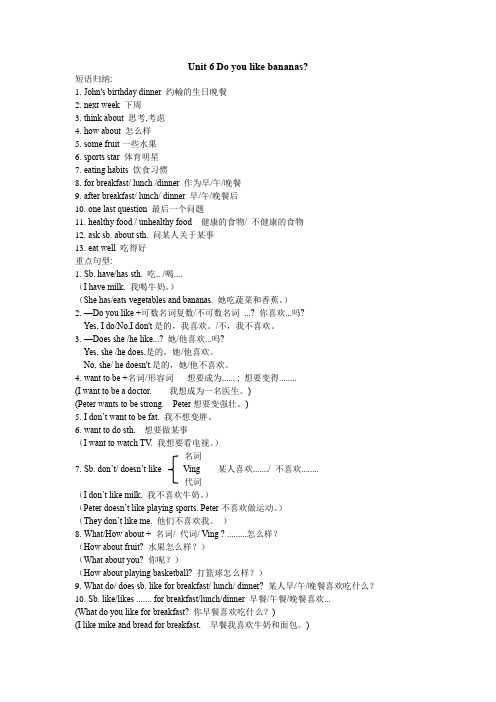
Unit 6 Do you like bananas?短语归纳:1.John's birthday dinner 约輸的生日晚餐2.next week 下周3.think about 思考,考虑4.how about 怎么样5.some fruit一些水果6.sport s star 体育明星7.eating habits 饮食习惯8.for breakfast/ lunch /dinner 作为早/午/晚餐9.after breakfast/ lunch/ dinner 早/午/晚餐后10.one last question 最后一个问题11.healthy food / unhealthy food 健康的食物/ 不健康的食物12.ask sb. about sth. 问某人关于某事13.eat well 吃得好重点句型:1.Sb. have/has sth. 吃.. /喝....(I have milk. 我喝牛奶。
)(She has/eats vegetables and bananas. 她吃蔬菜和香蕉。
)2.—Do you like +可数名词复数/不可数名词...? 你喜欢...吗?Yes, I do/No,I don't是的,我喜欢。
/不,我不喜欢。
3.—Does she /he like...? 她/他喜欢...吗?Yes, she /he does.是的,她/他喜欢。
No, she/ he doesn't.是的,她/他不喜欢。
4.want to be +名词/形容词想要成为...... ; 想要变得........(I want to be a doctor. 我想成为一名医生。
)(Peter wants to be strong. Peter想要变强壮。
)5.I don’t want to be fat. 我不想变胖。
6.want to do sth. 想要做某事(I want to watch TV. 我想要看电视。
2024年人教版初中英语七年级上册Unit 6 阶段专题复习-课件

可数名词
不可数名词
定义
可以计数的名词
不可以计数的名词
不同点
1. 有复数形式。 2. 可用不定冠词及数词等来修饰。 3. 可数名词作主语时,谓语动词的数由_____________来决定。
1. 没有复数形式。 2. 不可用不定冠词及数词等来修饰。 3. 不可数名词作主语时,谓语动词用____形式。
可数名词的数
单数
二、可数名词复数的变化规则
构成方式
例词
一般在词尾加-s
desk →desk_
以s,x,sh,ch结尾的加 -es
brush →brush__ watch →watch__
以“辅音字母+y”结尾的词,把y变为i,再加-es
stor__→stor___ strawberry→strawberr ___
喜 爱
水果、蔬菜
早 餐
鸡蛋、汉堡包、牛奶
午 餐
汉堡包、香蕉、冰激凌
晚 餐
鸡肉、西红柿、苹果
【思路点拨】 (1)体裁:_______。 (2)人称:用_________。 (3)时态:用___________。
说明文
本单元以谈论喜恶为话题,围绕这一话题谈论人们的一日三餐,描述人们的生活方式及健康饮食习惯。而最能全面体现本单元话题及语言运用能力的话题作文就是“谈论一日三餐”, 这也是单元测试和中考试题中常考的话题作文之一。
【习作在线】 假如你是Alice,请根据下列表格的内容写一篇英语短文。要求:50个词左右。 ____________________________________________________
- 1、下载文档前请自行甄别文档内容的完整性,平台不提供额外的编辑、内容补充、找答案等附加服务。
- 2、"仅部分预览"的文档,不可在线预览部分如存在完整性等问题,可反馈申请退款(可完整预览的文档不适用该条件!)。
- 3、如文档侵犯您的权益,请联系客服反馈,我们会尽快为您处理(人工客服工作时间:9:00-18:30)。
Unit 6 Do you like bananas?知识点一: .一般现在时:表示现阶段经常习惯做的动作或存在的状态。
1、用法:(1)表示现在的状态,如: He is twelve 他十二岁. She is at school. 她在学校..表示经常的或习惯性的动作。
如:She goes to school at 6:30 every day. 他每天6:30去学校.表示主语具备的性格和能力,如: He likes strawberries, 他喜欢草莓.They speak English. 他们说英语.2、句型;(1). be动词a.肯定句: 主语+ be ( am, is ,are) +………He is a student.他是个学生.b.否定句: 主语+ be ( am, is ,are) + not………He is not a student. 他不是学生.c.一般疑问句: Be ( Am, Is ,Are)+ 主语+…….?Is he a student?他是学生吗?回答:Yes,主语+be (am,is are). / No, 主语+be (am,is are)+not.Yes,he is . 是的,/No,he isn’t.不是.练习:用be动词的适当形式填空。
1. I ______ a student.2.________your father a worker? Yes, he_______.3. They _________in the classroom.4. This________ an apple.5. Where _______ my books?6. We_______ friends.7. You_______ a good student.8. These_______ her peas.9. How much ______the T-shirt?10. How much______ the socks?(2)实义动词谓语:A.主语是非第三人称单数的句型:a.肯定句:主语(非第三人称单数)+动词原形+……They like apples. 他们喜欢苹果。
b.否定句: 主语(非第三人称单数)+ do not(=don’t)+动词原形+… They don’t like apples.他们不喜欢苹果。
c.一般疑问句: Do + 主语(非第三人称单数)+动词原形+……?回答:Yes, 主语do./ No, 主语don’t.Do they like apples? 他们喜欢苹果吗?Yes, they do./No, they don’t 是的,他们喜欢。
/不,他们不喜欢。
B.主语是第三人称单数的句型a.肯定句: 主语(第三人称单数)+ 动词的第三人称单数+……He likes apples.他喜欢苹果。
b.否定句: 主语(第三人称单数)+ does not (=doesn’t) + 动词原形+……He doesn’t like apples.他不喜欢苹果。
c.一般疑问句: Does + 主语(第三人称单数)+动词原形+……?回答:Yes, 主语does. / No, 主语doesn’t.Does he like apples? 他喜欢苹果吗?Yes, he does. / N o, he doesn’t 是的,他喜欢。
/不,他不喜欢。
注意: 1、第三人称单数为第三人称的单个的人或物(如he /Li Ming, she / Xie Li, it / the sweater) 当句子主语是第三人称单数时,实义动词用第三人称单数形式。
2、动词第三人称单数的构成:a. 一般在词后加s . ( play—plays \ like---likes )b. 一般以辅音字母+ y结尾的把y改为i,再加es. ( study---studies).c. 一般以s, x, ch, sh ,o,结尾的单词,后加es. (teach---teaches )d. 不规则形式:have---has do---does练习;一、用所给词的适当形式填空。
1. He usually _____ (get) up at six in the morning.2. Mike usually_________ (ride) a bike with his friends in the park.3. He usually_______ (come) to school early.4. I often_______ (have) rice, meat and vegetables.5. My grandfather _______ (play) sports in the park.6. Miss Li _________ (teach) English in our school.7. The students of Class Four________(sing) a song on Monday.8. Who_____ (want) to go swimming?9. We________ (take) a shower in the evening.10. How many lessons _______your classmate______(have) on Monday?二、按照要求改写句子1. Daniel watches TV every evening. (改为否定句)2. I do my homework every day. (改为一般疑问句,作否定回答)3.She likes milk. (改为一般疑问句,作肯定回答)知识点二:几个动词的用法1. let后用动词原形let sb do sth. Let me have a look.2.. 1. like 喜欢1)like sb. / sth.喜欢某人/某物2) like to do sth.喜欢/想要做某事(表一次性或特指的某一具体的动作)3) like doing sth喜欢做某事(表习惯性的动作或爱好)①我喜欢每天打篮球。
I like playing basketball every day.②今天很冷,我喜欢呆在家里。
Today is cold, I like to stay at home.3. want(1) want sth. I want an apple. 我想要一个苹果。
(2)want to do sth. He wants to buy a bike. 他想买一辆自行车。
(3)want sb to do sth He wants his father to buy a bike for him.他想让他的父亲给他买辆自行车。
help sb do sth I help my mother do some housework. 我帮妈妈做家务。
help+人+with sth/doing sth. I help my mother with housework.知识点三: 名词的分类1)名词分为“专有名词”和“普通名词”两大类。
专有名词是个别的人、事物、地点等专有的名臣,如:Gina,China。
专有名词的第一个字母要大写。
2)普通名词游客分为下面四类:①个体名词:表示某类人或东西中的个体。
如pen, student, apple。
②集体名词:表示若干个体组成的集合体。
如family, class。
③物质名词:表示无法分为个体的物质。
如water, broccoli等。
④抽象名词:表示动作、状态、品质、情感等。
如work, happiness等。
个体名词和集体名词都是可数名词,物质名词和抽象名词都是不可数名词。
3)有些名词既可作可数名词又可作不可数名词,但意义不同,要注意区分。
①glass cn. 杯子un. 玻璃orange cn 橘子un. 橘汁②还有表示动物类的名词,表示动物时是可数名词,足为菜肴时是不可数名词。
chicken cn. 小鸡un. 鸡肉fish cn.鱼un. 鱼肉③salad, ice cream, food, fruit 作总称讲是不可数名词,作种类讲是可数名词She likes hamburgers, salad and apples.a salad of tomato知识点四:1. Do you like bananas?你喜欢香蕉吗。
可数名词可用复数表示一类人或事物2. 许多1) lots of = a lot of 修饰可数或不可数名词。
lots of / a lot of bananas lots of / a lot of water2)many修饰可数名词many boys many bananas3)much修饰不可数名词much water much broccoli3. running star 赛跑明星4. For breakfast, she likes eggs, bananas, and apples.= She likes eggs, bananas, and apples for breakfast.她早餐喜欢吃鸡蛋,香蕉和苹果。
sb like ....for + 某餐= For + 某餐,sb. like...(某人某餐喜欢吃什么)一日三餐用介词for . (have... for breakfast \ lunch \ dinner)单元检测一、用be动词的适当形式填空。
1. Our mother ______forty.2. You can _______ in our school music club.3. I want to ______a teacher.4. Let’s _______friends.5. He and I ______friends.6. Tina _____a student.7. Mary and Tom _______students.8. Someone______ in the room.9. Who ______your brother?10. When_______ your uncle’s birthday?二、用所给词的适当形式填空。
1. _____ (do) she _____ (like) playing the violin? Yes, she_____ (do).2. Alice and Jerry ________ _(not do) homework after school.3._______your mother_________(watch)TV every day?4. _____your sister_____(know)English?5. Mary________ ______ (not come) from America. She ____(come) from Britain.6. Many people often _______ (listen) to the radio in the morning.7. ________you _________ (brush) your teeth every morning.8. What________ (do) he usually ________(do) after school?9.______Mike sometimes ______(go) to the park with his sister.0. _______Mike ________ (read) English every day?11. The boy _________ (like) playing football.12. She________ (write) to her mother once a week.13. It _____ (rain) quite often during the month of July every year.三句型转换,每空一词1. My brother likes tomatoes. (改为否定句)My brother ______ ______ tomatoes.2. Do you like broccoli and French fries? (作否定回答)No, ______ _______.3. Mary likes apples for breakfast. (对画线部分提问)_______ does Mary _______ for breakfast?4. They have some oranges. (用he 作主语改为单数句子)He ______ ______ orange.5. Kate often eats pears. (改为一般疑问句)______ Kate often ______ pears?四.用括号中所给词的正确形式填空1.There are some ________(tomato)in the basket.2.Do you like ________(banana)?3.She ________(have)ice cream .4.________(health)food is important.5.She ________(do not)play sports.6.________ your mother ________(watch)TV every day?7.The little girl likes ________(strawberry).8.Lots of children(孩子们) like ________(play)football.9.Chicken ________(be)very delicious(美味的).10.My daughter ________(go)to school from Monday to Friday.五.单项选择()1.— Do you like apples? — ________.A.Yes, I am B.Yes, I do C.No, I’m not D.No, I not ()2.— Does your son like carrots? — ________.A.Yes, she does B.Yes, he is C.No, he doesn’t D.No, she doesn’t ()3.He has ________ egg and ________ hamburger.A.an, an B.a, a C.an, a D.a, an()4.There is a ________ shop. It sells bananas, apples, pears and oranges.A.vegetable B.food C.fruit D.drink ()5.What ________ she have ______ dinner?A.do, in B.does, for C.is, at D.can, to ()6.There is some ________ on the table.A.tomato B.egg C.chicken D.banana ()7.I _______ at home..A.have a lunch B.have the lunch C.have lunch D.has lunch ()8.— Do you like oranges ? — ________.A.Yes, I do B.Yes, I don’tC.I like them very much D.I don’t like them()9.________ your mother ________ carrots?A.Do; eat B.Is; eat C.Does; eat D.Are; eat()10.Our friend _______like salad.A.don’t B.does n’t C.isn’t D.aren’t ()11.— Do they like hamburgers? — Yes, they like ______ very much.A.it B.them C.their D.its ()12.Her parents ________ lunch at home.A.doesn’t have B.haven’t C.has’t D.don’t have ()13.We have nice food _____ dinner.A.in B.at C.for D.on ()14._______ does Lucy like? ----Tomatoes.A.How B.What C. Where D.Why ()15.Aunt Li likes _____bananas.A.eat B.eating C.eats()16.There are some _______ and _______ on the desk.A. radios, photosB. radioes, photosC. radios, photoes()17. Do you like _______ soccer?A.playsB.playingC.to play()18. John usually(常常)_______ eggs and banana _______ breakfact.A、has,withB、have,forC、have,withD、has,for()19. Tim is a ______ boy and he studies(学习) ______ at school.A.good; wellB. good; goodC. well; well()20. Tom _________ vegetables for lunch.A. doesn’t likeB. don’t likeC. doesn’t drinkD. isn’t like ()21. There is much __________ in the bowl.A. meatB. appleC. orangesD. vegetables()22. --Mom, I want _________.--Here you are.A. a breadB. a piece of breadC. some breadsD. breads。
